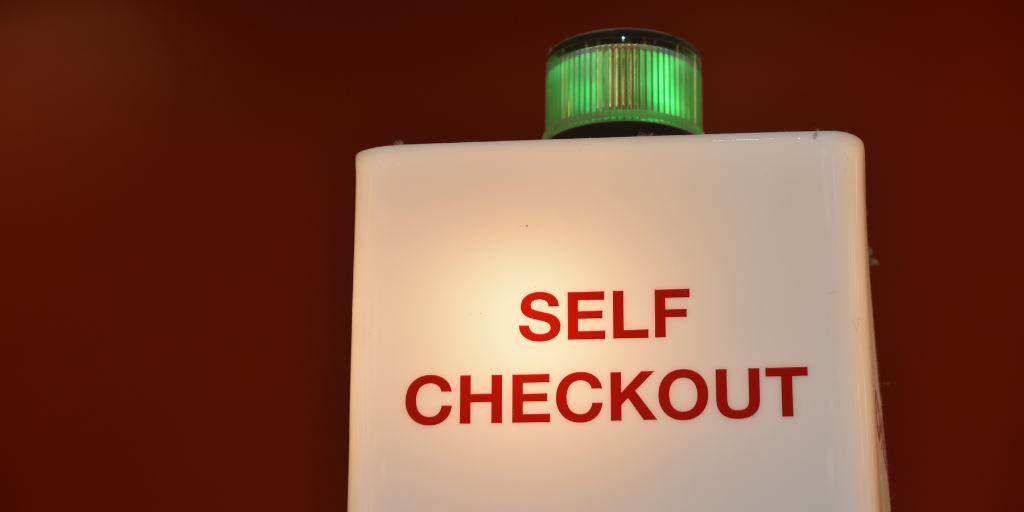Self-service has gained in popularity among consumers, and it’s no different when it comes to grocery shopping. In fact, self-checkout accounted for 55% of grocery shopping transactions last year, according to the latest study by VideoMining. Should you jump on the bandwagon if you haven’t already?
Let’s weigh the pros and cons of grocery store self-checkout and see how you can address the challenges with new technologies and integrations.
The Pros of Grocery Store Self-Checkout
Grocery store self-checkout offers many benefits, including:
Shorter Lines and Wait Time
You can fit more self-checkout systems and serve more customers (e.g., replacing 2 manual checkout lanes with 6 self-checkouts) to reduce wait time, shorten lines, lessen frustration, and deliver a better customer experience. The process will only become faster and smoother as more consumers become accustomed to self-checkout.
Reduced Labor Cost
Instead of staffing each register with a cashier, you can have one team member manage 6-10 self-checkout lanes simultaneously to ensure customers get the assistance they need when they need it. You can serve more customers with the same number of employees and manage traffic spikes more efficiently.
A Modern Customer Experience
New technologies have made customer self-service more seamless and frustration-free in various industries. Many consumers prefer self-checkout, and Millennials, in particular, are most comfortable with self-service. Advanced POS systems and self-checkout systems with an intuitive user interface can help you meet consumer expectations while streamlining operations.
The Cons of Grocery Store Self-Checkout
Here are some potential drawbacks you may consider:
Increased Risk of Theft
Since it isn’t possible or desirable to have employees monitoring a customer’s every move during the self-checkout process, criminals have more opportunities to “cheat the system” (e.g., switching barcodes or PLUs.) Skimmer and shimmer frauds have also become a concern at supermarket self-checkouts.
Technical Issues
Less tech-savvy customers may find the new technologies intimidating. Meanwhile, software glitches and overly sensitive scale or barcode readers may cause errors that require a customer to wait for an employee for assistance — leading to a frustrating experience that self-checkout aims to solve in the first place.
Lack of a Personalized Experience
While some customers prefer self-checkout for speed, others find the experience isolating. Self-checkout reduces the opportunities for store associates to connect with shoppers and deliver a personalized experience that can help foster relationships and increase customer loyalty.
Modern POS Systems Address Self-Checkout Challenges
The good news is that you don’t have to be held back by the potential drawbacks, as new technologies and business models can address many of these issues.
Loss Preventing Technologies
Improved security measures, such as video surveillance and artificial intelligence (AI), record and analyze shoppers’ scanning activities to detect unscanned or switched items. These systems can also alert store associates to intervene if a shopper fails to re-scan the items correctly.
Cloud-Based Subscription Model
An as-a-service model allows businesses to access the latest hardware, software, and services without the high upfront cost. The flat fee turns capital expenditure (CapEx) into operational expenditure (OpEx) to improve your financial health while covering all the maintenance and upgrades you need to deliver a modern customer experience.
The latest version of DUMAC’s RORC grocery store point-of-sale solution gives you access to our complete POS system with guaranteed maintenance pricing for 3 years. The subscription fee covers hardware, software, and network management, so you don’t have to worry about surprise bills.
Intuitive User Interface
Today’s self-checkout systems prioritize a seamless and intuitive user experience so customers are less likely to require assistance from store employees. New technologies, such as AI-driven produce recognition functions, can further reduce the time and effort required to look up item codes.
Omnichannel Personalization
A robust POS that integrates with various customer touchpoints (e.g., eCommerce site, mobile app, loyalty program) helps you deliver a seamless and personalized online and offline shopping experience to grow customer relationships whether they’re in your store or at home planning their next shopping trip.
Age-Restricted Sales
Traditional self-checkout often requires a store employee to validate a customer’s age when purchasing restricted items such as alcohol, tobacco, etc. New facial scanning and ID verification technologies can help eliminate the wait time associated with manual age validation to streamline the checkout experience.
Modernize Your Customer Experience With Grocery Store Self-Checkout
Grocery store self-checkout has become an integral part of the modern customer experience. To meet consumer expectations, you need a POS system that integrates with other customer touchpoints and a vendor that can provide ongoing support to keep your system current.
RORC is a complete solution that integrates an advanced POS system with back-office software and a loyalty program to help grocery stores improve cost efficiency and customer experience. Learn more about RORC and get in touch to see how we can help.


Comments